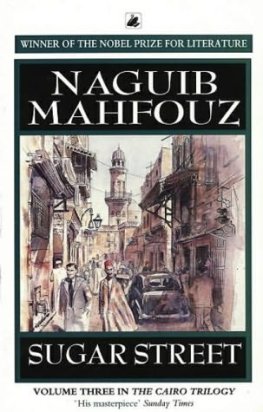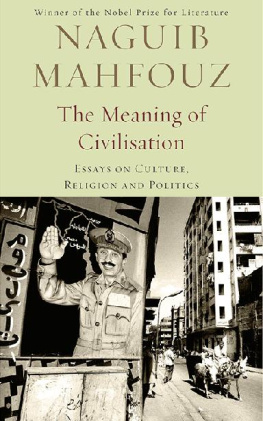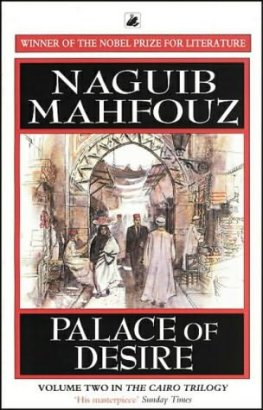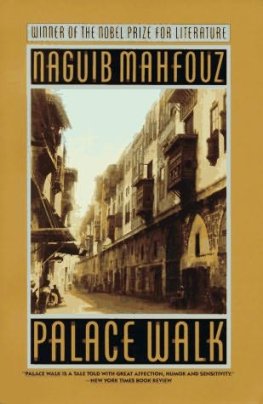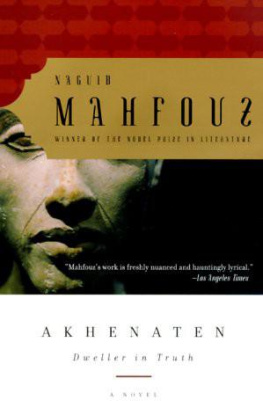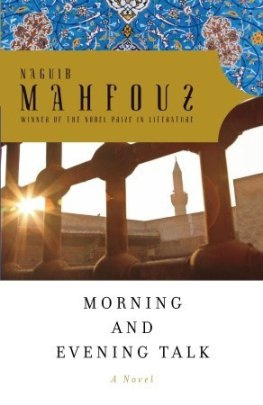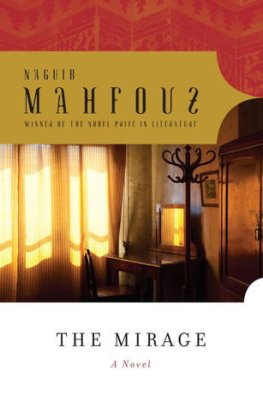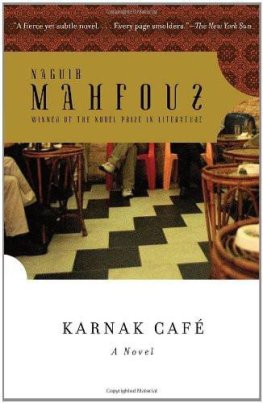Naguib Mahfouz
Sugar Street
Their heads were huddled around the brazier, and their hands were spread over its fire: Amina's thin and gaunt, Aisha's stiff, and Umm Hanafi's like the shell of a turtle. The beautiful pure-white ones were Na'ima's. The January cold was almost severe enough to freeze water at the edges of the sitting room, which had retained its time-honored appearance with its colored mats and the sofas distributed around the sides. The old lantern with its oil lamp had vanished, and hanging in its place was an electric light. The location had changed too, for the coffee hour had returned to the first floor. Indeed the entire upper story had moved downstairs to make life easier for the father, whose heart was no longer strong enough for him to climb to the top.
The family members had changed as well. Amina's body had withered, and her hair had turned white. Although barely sixty, she looked ten years older, and her transformation was nothing compared to Aisha's decline and disintegration. It was ironic or pathetic that the daughter's hair was still golden and her eyes blue, when her listless glance gave no hint of life and her pale complexion seemed the symptom of some disease. With a protruding bone structure and sunken eyes and cheeks, her face hardly appeared that of a thirty-four-year-old woman. Although the years had settled on Umm Hanafi, they did not seem to have marked her in any essential way, hardly diminishing her reserves of flesh and fat. Instead, they had accumulated on her skin and around her neck and mouth like crusts or earthy deposits. But her grave eyes glinted from participation in the family's silent sorrow.
Na'ima stood out in this group like a rose growing in a cemetery, for she had developed into a beautiful young woman of sixteen. Her head enveloped by a halo of golden hair and her face adorned by blue eyes, she was as lovely as her mother, Aisha, had been or even more captivating but as insubstantial as a shadow. Her eyes had a gentle, dreamy look suggesting purity,[innocence, and otherworldliness. She nestled against her mother's side, as though unwilling to be alone even for a moment.
Rubbing her hands together over the brazier, Umm Hanafi said, "The builders will finish the project this week after working for a year and a half."
Na'ima responded sarcastically, "A building for Uncle Bayumi the drinks vendor."
Aisha raised her eyes from the brazier to look at Umm Hanafi for a moment but made no comment. They had previously learned that the house once belonging to Mr. Muhammad Rid-wan would be torn down to allow construction of a four-story building for Uncle Bayumi the drinks vendor. This project had stirred up many old memories about Maryam and her divorce from Yasin what had become of Maryam? and about Maryam's mother and her marriage to the drinks vendor Bayumi, who had gained possession of the house half by inheritance and half by purchase. Back then life had been worth living, and hearts had been carefree.
Umm Hanafi continued: "The most beautiful part of it, my lady, is Uncle Bayumi's new place for soft drinks, ice cream, and sweets, tt has lots of mirrors and electric lights, with a radio playing day and night. I feel sorry for Hasanayn the barber, Darwish the bean seller, al-Fuli the milkman, and Abu Sari' with his snack shop. They have to look out of their dilapidated premises at the store and apartments of their former comrade."
Pulling her shawl tighter around her shoulders, Amina said, "Glory to God who gives blessings."
With her arms around her mother's neck, Na'ima commented, "The building blocks off our roof on that side. Once it's inhabited, how can we spend any time up there?"
Amina could not ignore the question raised by her beautiful granddaughter, if only out of concern for Aisha. She answered, "Pay no attention to the tenants. Do as you like."
She glanced at Aisha to see what impression her gracious reply had made. She was so afraid for her daughter that she was almost frightened of her. But Aisha was busy looking at herself in the mirror above the dresser between her room and her father's. She had not abandoned the custom of examining her reflection, even though it had become a meaningless exercise. With the passing days her face's withered appearance had ceased to alarm her.
Whenever a voice inside asked, "Where is the old Aisha?" she would answer indifferently, "And where are her sons, Muhammad and Uthman, and her husband, Khalil?"
Observing this, Amina was saddened, and her gloom quickly affected Umm Hanafi, who was so much a part of the family that their worries were hers.
Na'ima rose and went to the radio, which stood between the doors to the parlor and the dining room. Turning it on, she said, "It's time for the records, Mama."
Aisha lit a cigarette and inhaled deeply. Amina stared at the smoke, which spread out in a thin cloud over the brazier. A voice on the radio sang, "Companions from the good old days, how I wish you would return."
Na'ima resumed her seat, tucking the robe around her. Like her mother, she loved singing. She listened carefully so she could memorize the song and sing it in her pleasing voice. This interest was not dampened by the religious feelings that dominated her entire emotional life. She prayed conscientiously and had fasted during the month of Ramadan since the age often. She frequently dreamed of the mysteries of the spiritual realm and welcomed with limitless delight her grandmother's invitations to visit the mosque of al-Husayn. All the same she had never weaned herself from a love of singing. She sang whenever she was alone, in her room or in the bath.
Aisha approved of everything her one remaining child did, for Na'ima was the only bright hope on otherwise gloomy horizons. As pleased by her daughter's piety as by her voice, Aisha even loved and encouraged the girl's excessive attachment to her, not tolerating any comment on it. In fact, she had no patience for any kind of criticism, no matter how trivial or well-intentioned. Her only occupations at home were sitting, drinking coffee, and smoking. Whenever her mother invited her to help with the housework, not from a need for assistance but to distract Aisha from her thoughts, she was annoyed and uttered her famous phrase: "Oh, leave me alone". She would not let Na'ima lift a finger to help with the work either, since she feared the least exertion for her daughter. If she could have performed the prayer ritual for Na'ima, she would have, to spare her the effort.
Amina frequently chided Aisha about this, telling her that Na'ima was almost old enough to marry and needed to learn the duties of a housewife. Aisha always responded angrily, "Don't you see she's like a specter? My daughter can't bear any exertion. Leave her alone. She's my sole hope in the world."
Then, heartbroken, Arnina would abandon the conversation. Gazing sadly at Aisha, she saw the personification of shattered hopes. When she looked at this unhappy face, which seemed to have lost all its vitality, Amina's soul was overcome by sorrow. Apprehensive about distressing her daughter, she had learned to greet Aisha's rude answers and harsh comments with affectionate forbearance.
The voice kept on singing, "Companions from the good old days," while Aisha smoked and listened to the song. She had been fond of singing once, and sorrow and despair had not killed her taste for it. Perhaps they had even enhanced it, since so many of the lyrics were plaintive and melancholy. Of course nothing could ever bring back her companions of the good old days. She wondered at times if that past had been a reality or a dream, a figment of her imagination. Where was that happy home? Where was her fine husband? Where were Uthman and Muhammad? Did only eight years separate her from that past?
Amina rarely liked these songs. The prime attraction of the radio for her was that it allowed her to hear recitations from the holy Qur'an and the news. The sad themes of the songs worried her. She was concerned about their effect on her daughter and remarked to Umm Hanafi one day, "Don't they sound like funeral laments to you?"

